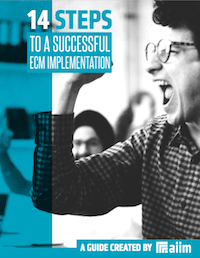The AIIM Blog
Keep your finger on the pulse of Intelligent Information Management with industry news, trends, and best practices.
Enterprise Content Management (ECM) | Sharepoint and Office 365
Microsoft recently released the beta version of SharePoint 2010. From a content management perspective, their goal was to provide “ECM for the Masses." But what exactly does that mean, and how does Microsoft expect to achieve it? I spent time over the last few months test driving the beta, and the technical preview versions with an eye toward “ECM for the Masses.” Here are eight ways SharePoint 2010 is bringing Enterprise Content Management (ECM) into the mainstream:
Share
Enterprise Content Management (ECM)
1. You Can Get Started on an ECM Project – NOW. Need to get an ECM project moving now--even if you don't have much budget today? Open source ECM offerings let companies get started with early requirements research, prototyping, and piloting just with a simple download and installation. In the spirit of community, of transparency, of truly believing that ECM is a critical platform for any customer in the 21st-century knowledge economy, open-source ECM vendors actually want you to get moving forward on a project.
Share

Making an ECM implementation successful requires planning and attention to detail. The best way to create the right solution is to identify organizational goals and priorities. Learn how to manage a successful implementation in our free guide.
Enterprise Content Management (ECM)
In the later part of 2008, OASIS announced the formation of a committee to develop the Content Management Interoperability Standard (CMIS), designed to standardize a web services interface specification that will enable interoperability of Enterprise Content Management (ECM) systems. EMC, IBM, and Microsoft lead the way by developing the initial draft for the standard. Other ECM vendors such as Alfresco, Open Text, Oracle, and SAP reviewed the draft and provided comments before advancing the standard through the standardization process. Here are eight reasons why CMIS will transform the ECM industry:
Share
Enterprise Content Management (ECM) | Enterprise Search | Sharepoint and Office 365
SharePoint supports document searching out-of-the box, but with some simple customizations, you can greatly improve the findability of documents.
Share
Archiving | Enterprise Content Management (ECM)
With the vast number of disparate systems in an organization, along with their relative complexity and enormous amounts of data, ECM migrations can be daunting. This brief list of eight considerations in undertaking an ECM migration is meant to provide a common-sense approach to addressing the process.
Share
Electronic Records Management (ERM) | Enterprise Content Management (ECM) | Information Governance
Before getting started with an implementation, and way before moving onto the eight secrets, it is useful to recall why you are considering a content or records management implementation in the first place and to confirm there's a commitment to proceed. This kind of "strategic mobilization" should kick off any ECM or ERM project. To do this effectively, organizations should gather sponsors and stakeholders, identify the team that will lead the project, understand what the vision of the sponsor of the project is, and understand where significant gaps are likely to arise.
Share